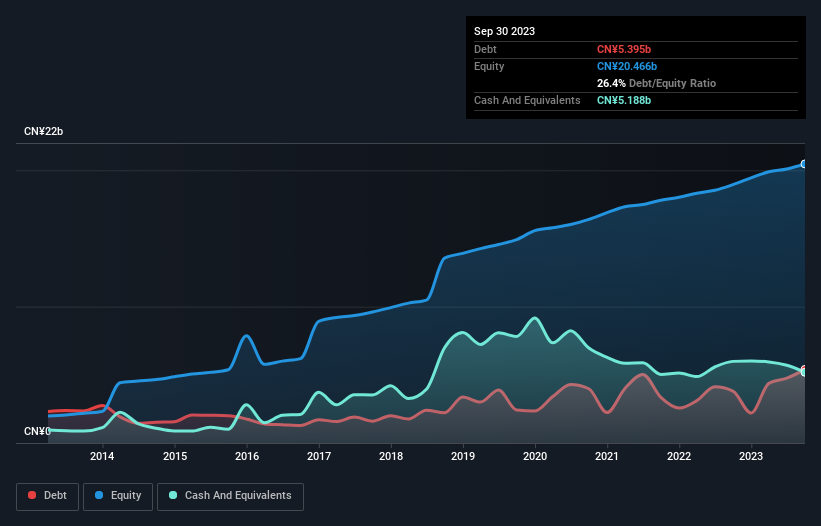- China
- /
- Healthcare Services
- /
- SZSE:000028
China National Accord Medicines (SZSE:000028) Has A Rock Solid Balance Sheet

Some say volatility, rather than debt, is the best way to think about risk as an investor, but Warren Buffett famously said that 'Volatility is far from synonymous with risk.' So it might be obvious that you need to consider debt, when you think about how risky any given stock is, because too much debt can sink a company. Importantly, China National Accord Medicines Corporation Ltd. (SZSE:000028) does carry debt. But the real question is whether this debt is making the company risky.
When Is Debt A Problem?
Debt is a tool to help businesses grow, but if a business is incapable of paying off its lenders, then it exists at their mercy. Ultimately, if the company can't fulfill its legal obligations to repay debt, shareholders could walk away with nothing. However, a more common (but still painful) scenario is that it has to raise new equity capital at a low price, thus permanently diluting shareholders. Of course, the upside of debt is that it often represents cheap capital, especially when it replaces dilution in a company with the ability to reinvest at high rates of return. The first thing to do when considering how much debt a business uses is to look at its cash and debt together.
Check out our latest analysis for China National Accord Medicines
What Is China National Accord Medicines's Debt?
The image below, which you can click on for greater detail, shows that at September 2023 China National Accord Medicines had debt of CN¥5.39b, up from CN¥3.81b in one year. However, because it has a cash reserve of CN¥5.19b, its net debt is less, at about CN¥206.8m.

A Look At China National Accord Medicines' Liabilities
According to the last reported balance sheet, China National Accord Medicines had liabilities of CN¥28.1b due within 12 months, and liabilities of CN¥2.20b due beyond 12 months. Offsetting these obligations, it had cash of CN¥5.19b as well as receivables valued at CN¥25.4b due within 12 months. So these liquid assets roughly match the total liabilities.
Having regard to China National Accord Medicines' size, it seems that its liquid assets are well balanced with its total liabilities. So while it's hard to imagine that the CN¥16.1b company is struggling for cash, we still think it's worth monitoring its balance sheet. But either way, China National Accord Medicines has virtually no net debt, so it's fair to say it does not have a heavy debt load!
We measure a company's debt load relative to its earnings power by looking at its net debt divided by its earnings before interest, tax, depreciation, and amortization (EBITDA) and by calculating how easily its earnings before interest and tax (EBIT) cover its interest expense (interest cover). Thus we consider debt relative to earnings both with and without depreciation and amortization expenses.
China National Accord Medicines has barely any net debt, as demonstrated by its net debt to EBITDA ratio of only 0.08. Humorously, it actually received more in interest over the last twelve months than it had to pay. So it's fair to say it can handle debt like an Olympic ice-skater handles a pirouette. And we also note warmly that China National Accord Medicines grew its EBIT by 12% last year, making its debt load easier to handle. The balance sheet is clearly the area to focus on when you are analysing debt. But ultimately the future profitability of the business will decide if China National Accord Medicines can strengthen its balance sheet over time. So if you're focused on the future you can check out this free report showing analyst profit forecasts.
Finally, a business needs free cash flow to pay off debt; accounting profits just don't cut it. So it's worth checking how much of that EBIT is backed by free cash flow. Over the most recent three years, China National Accord Medicines recorded free cash flow worth 64% of its EBIT, which is around normal, given free cash flow excludes interest and tax. This free cash flow puts the company in a good position to pay down debt, when appropriate.
Our View
China National Accord Medicines's interest cover suggests it can handle its debt as easily as Cristiano Ronaldo could score a goal against an under 14's goalkeeper. And the good news does not stop there, as its net debt to EBITDA also supports that impression! It's also worth noting that China National Accord Medicines is in the Healthcare industry, which is often considered to be quite defensive. Overall, we don't think China National Accord Medicines is taking any bad risks, as its debt load seems modest. So the balance sheet looks pretty healthy, to us. There's no doubt that we learn most about debt from the balance sheet. However, not all investment risk resides within the balance sheet - far from it. For instance, we've identified 1 warning sign for China National Accord Medicines that you should be aware of.
If, after all that, you're more interested in a fast growing company with a rock-solid balance sheet, then check out our list of net cash growth stocks without delay.
New: AI Stock Screener & Alerts
Our new AI Stock Screener scans the market every day to uncover opportunities.
• Dividend Powerhouses (3%+ Yield)
• Undervalued Small Caps with Insider Buying
• High growth Tech and AI Companies
Or build your own from over 50 metrics.
Have feedback on this article? Concerned about the content? Get in touch with us directly. Alternatively, email editorial-team (at) simplywallst.com.
This article by Simply Wall St is general in nature. We provide commentary based on historical data and analyst forecasts only using an unbiased methodology and our articles are not intended to be financial advice. It does not constitute a recommendation to buy or sell any stock, and does not take account of your objectives, or your financial situation. We aim to bring you long-term focused analysis driven by fundamental data. Note that our analysis may not factor in the latest price-sensitive company announcements or qualitative material. Simply Wall St has no position in any stocks mentioned.
About SZSE:000028
China National Accord Medicines
China National Accord Medicines Corporation Ltd.
Flawless balance sheet, good value and pays a dividend.
Market Insights
Community Narratives



